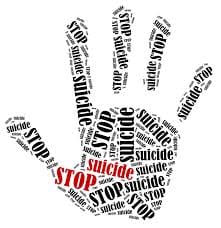Suicide is the tenth leading cause of death in the U.S. and third among young people. I first had suicidal thoughts when I was nineteen and in college. I thought I would kill myself by cutting my wrists, but I couldn’t cut deep enough and once I started bleeding then I would feel relieved and be able to go to sleep. I eventually overdosed on medication but only became a little sick. [Editor’s note: Cutting is not always associated with suicide. There are many reasons that might lead a person to self harm that are not related to suicide. Learn more about self harm here.]
Over the years, I have often had suicidal thoughts. They are always preceded by thoughts about cutting, and then they progress to thoughts about overdosing. I started to attempt suicide once but realized I hadn’t left a note for my parents so they would know it wasn’t their fault so I called a social worker I was seeing who talked me out of it. Three times, I’ve been hospitalized because I was suicidal.
I have learned something though with the help of my therapist and Mary Ellen Copeland’s WRAP Plan, and that is to take care of myself. I haven’t been hospitalized for over fifteen years, and my life is seldom majorly disrupted because of suicidal thoughts. I have a safety plan.
When I have thoughts about cutting, I realize something isn’t right in my life. Sometimes I can alter things so the thoughts go away. Sometimes I can’t. As soon as I began to think about killing myself, I do the following things. First, I give all my medication to my daughter who lives next door. I call my case manager so they can talk to my psychiatrist to see if I should increase my antidepressant. I increase the anti-psychotic I take as needed so my thoughts slow down and I can’t think about my thoughts instead of being bombarded by them. I at least let my therapist know – sometimes I go in to talk to him. Doing these things helps me not be so anxious about how I am feeling and keeps me safe and able to function.
A few weeks ago, I became very depressed suddenly and had suicidal thoughts. I thought how easy it would be and how my struggle would finally be over. I planned to email my therapist who would get my email in the morning when he came in. I was going to ask him to report my death to the police so they could find my body and let my daughter know. Then I realized I would be breaking trust with him and with my daughters because they trust that I will follow my safety plan. More importantly, I would be breaking trust with myself. Eventually, I emailed my therapist and told him what I had been thinking, that I would follow my safety plan and give my meds to my daughter in the morning, that I was going to bed, and would remain safe.
I’m really glad I once again followed my treatment plan.
Rev. Mary Alice Do, who has bipolar disorder, is a retired Disciples of Christ minister and has worked 16 years in the mental health community providing recovery information and advocacy. Read the rest of her posts for IBPF here, or watch her webinar on How Churches Can Promote Recovery. She also has a blog of her life story called Journey Towards Wellness.


